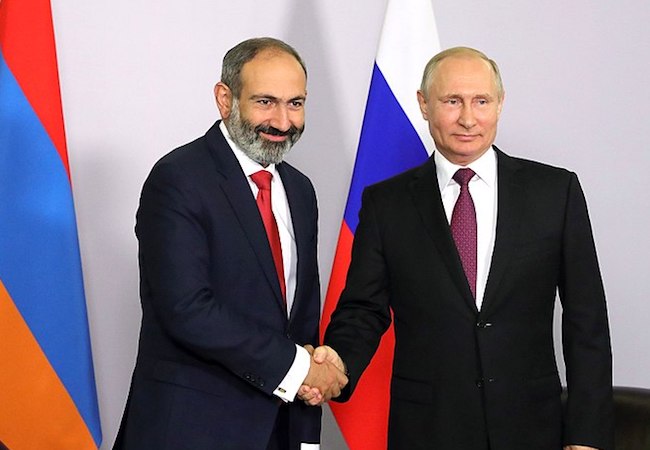Why did Armenia derail peace process in the South Caucasus?

By Shahmar Hajiyev
The occupation of the Azerbaijani territories by Armenia in the South Caucasus has contributed to a long-lasting war, full-scale humanitarian crisis and forced displacement of people. As a result of the military actions in 1992-1994 around twenty percent of Azerbaijani territory has been occupied and over one million people became refugees and internally displaced persons (IDPs).
After a ceasefire agreement signed in 1994 between Azerbaijan and Armenia and long diplomatic negotiations through the Co-Chairs of the OSCE Minsk Group, the warring parties could not restore peace, because the current status quo is more favorable to Armenia as they continue to occupy the Azerbaijani territories, as well as support illegal settlement and economic policy in the Azerbaijani occupied territories.
The recent serious escalation in the Tovuz region of Azerbaijan in July 2020 proved that cease-fire regime is very fragile. On August 23, 2020 the commander of Armenia’s sabotage-reconnaissance group, a senior lieutenant Gurgin Alberyan was captured by Azerbaijani armed forces during an operation to repel an attack on Azerbaijani positions in the western Goranboy district.
All the above-mentioned facts are the reasonable continuation of the Armenian new military doctrine “new war for new territories” declared by the Armenian Minister of Defence David Tonoyan in March 2019. According to him, it “will rid Armenia of this trench condition, the constant defensive state, and will add the units which may shift the military actions to the territory of the enemy”. Towards this end, the Armenian government also advanced the creation of militia troops.
The situation became even worse when Armenian leadership decided to settle illegally Lebanese-Armenians from the Middle East in the occupied territories. According to Armenia’s new High Commissioner of Diaspora, Affairs Zareh Sinanyan ““Until now 800 Lebanese-Armenians have arrived in Armenia, some of them came before the Beirut explosion but after July 1, when the first plane landed in Yerevan, with the rest arriving after the August 4 explosion”. Some of these families were settled in the occupied territories.
On the eve of such developments, Armenia committed another large-scale military provocation against Azerbaijan on September, 27, 2020. This escalation was the biggest and the most serious one since the 1990s. Armenian military forces used large-caliber weapons, mortars and other weapons against Azerbaijan. As a result of this operation, there were several casualties among the armed forces and civilian population, including five members of one family of Naftalan region of Azerbaijan.
Azerbaijan uses its legal right to self-defense and counter-attack the Armenian military forces in order to protect the population and restore its sovereignty. This is the ultimate right of Azerbaijan in accordance to Article 51 of the UN Charter. It should be mentioned that the war between Armenia and Azerbaijan is on the internationally recognized territory of Azerbaijan.
Besides the issue of the occupied territories, some other development contributed to the recent escalation. Since the 1990s Azerbaijan advances regional economic integration and promotes international energy cooperation through inter-regional energy projects for carrying Caspian crude oil and natural gas to global energy markets.
Azerbaijan implemented important energy projects such as the BTC (Baku-Tbilisi-Ceyhan) pipeline. This project opened up a new era for economic development and provided Azerbaijan with an opportunity to export its oil through Georgia and Turkey to the Western energy markets. The project contributed to the economic, political, and energy security of all involved parties, first of all European consumers. From the pipeline becoming operational in June 2006 up to the end of the first quarter of this year, it had exported a total of 3.41 billion barrels of crude oil to global markets.
Today, Azerbaijan is also becoming an important net gas producer, and the country is interested in deepening its energy relations with Europe. It is important to highlight that Azerbaijan plays an important role in the Turkish domestic gas market too, and gradually, its share is increasing. In 2019, Azerbaijan and Turkey finalized the final phase of the TANAP pipeline which will carry Azerbaijani gas from Shah-Deniz Stage 2 to Turkey and Europe. For example, Azerbaijan was in the first place in the Turkish gas market with 23.45% gassupply in March of the current year.
To export Caspian gas to European energy markets, Azerbaijan initiated another energy megaproject named the Southern Gas Corridor (SGC). The SGC is planned to deliver gas to Europe in 2020. It should be underlined that even the COVID-19 could not prevent the implementation of this project and, by the end of August 2020, the TAP project was almost 98% complete. On 25 November, the TAP AG started to introduce the first natural gas into a 2 km section of the pipeline in Greece between the Evros river and the Kipoi compressor station.
This development manifests that Azerbaijan cooperates successfully with its partners, and its growing role as major energy supplier worry Armenia and other players. Towards this end, Armenian provocation against Azerbaijan must be considered as a real threat to regional stability and to mega energy projects. It is very clear that the Armenian decision to abandon the peace process by denying the Madrid Principles, intended to restore peace in the region, was aimed at destabilization of the security situation in the South Caucasus.
Shahmar Hajiyev is the Senior advisor at the Center of Analysis of International Relations in Baku, Azerbaijan




